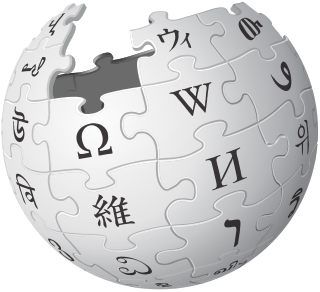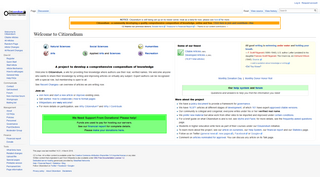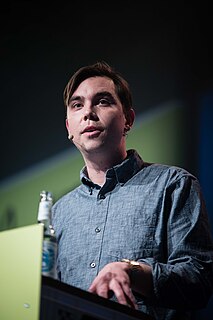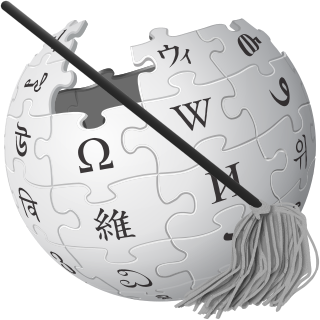
Wikipedia began with its first edit on 15 January 2001, two days after the domain was registered by Jimmy Wales and Larry Sanger. Its technological and conceptual underpinnings predate this; the earliest known proposal for an online encyclopedia was made by Rick Gates in 1993, and the concept of a free-as-in-freedom online encyclopedia was proposed by Richard Stallman in 1998.

A wiki is an online hypertext publication collaboratively edited and managed by its own audience, using a web browser. A typical wiki contains multiple pages for the subjects or scope of the project, and could be either open to the public or limited to use within an organization for maintaining its internal knowledge base.

Jimmy Donal Wales, also known on Wikipedia by the pseudonym Jimbo, is an American-British Internet entrepreneur, webmaster, and former financial trader. He is a co-founder of the online non-profit encyclopedia Wikipedia and the for-profit wiki hosting service Fandom. He has worked on other online projects, including Bomis, Nupedia, WikiTribune, and WT Social.
Some edits to the online encyclopedia Wikipedia by staff of the United States Congress have created controversy, notably in early to mid-2006. Several such instances, such as those involving Marty Meehan, Norm Coleman, Conrad Burns, and Joe Biden, received significant media attention. Others, such as those involving Gil Gutknecht, were reported but received less widespread coverage.

Most criticism of Wikipedia has been directed toward its content, its community of established users, and its processes. Critics have questioned its factual reliability, the readability and organization of the articles, the lack of methodical fact-checking, and its political bias. Concerns have also been raised about systemic bias along gender, racial, political, corporate, institutional, and national lines. In addition, conflicts of interest arising from corporate campaigns to influence content have also been highlighted. Further concerns include the vandalism and partisanship facilitated by anonymous editing, clique behavior from contributors as well as administrators and other top figures, social stratification between a guardian class and newer users, excessive rule-making, edit warring, and uneven application of policies.

Wikipedia is a multilingual free online encyclopedia written and maintained by a community of volunteers through open collaboration and a wiki-based editing system. Its editors are known as Wikipedians. Wikipedia is the largest and most-read reference work in history. It is consistently one of the 10 most popular websites ranked by Similarweb and formerly Alexa; as of 2022, Wikipedia was ranked the 7th most popular site. It is hosted by the Wikimedia Foundation, an American non-profit organization funded mainly through donations.

The reliability of Wikipedia concerns the validity, verifiability, and veracity of Wikipedia and its user-generated editing model, particularly its English-language edition. It is written and edited by volunteer editors who generate online content with the editorial oversight of other volunteer editors via community-generated policies and guidelines. Wikipedia carries the general disclaimer that it can be "edited by anyone at any time" and maintains an inclusion threshold of "verifiability, not truth". This editing model is highly concentrated, as 77% of all articles are written by 1% of its editors, a majority of whom have chosen to remain anonymous. The reliability of the project has been tested statistically through comparative review, analysis of the historical patterns, and strengths and weaknesses inherent in its editing process. The online encyclopedia has been criticized for its factual reliability, principally regarding its content, presentation, and editorial processes. Studies and surveys attempting to gauge the reliability of Wikipedia have mixed results, with findings varied and inconsistent. Wikipedia's reliability was frequently criticized in the 2000s but has improved over time; it has been generally praised in the late 2010s and early 2020s.

Citizendium is an English-language wiki-based free online encyclopedia launched by Larry Sanger, co-founder of Nupedia and Wikipedia.

Conservapedia is an English-language, wiki-based, online encyclopedia written from a self-described American conservative and fundamentalist Christian point of view. The website was established in 2006 by American homeschool teacher and attorney Andrew Schlafly, son of the conservative activist Phyllis Schlafly, to counter what he perceived as a liberal bias in Wikipedia. It uses editorials and a wiki-based system for content generation.

WikiScanner was a publicly searchable database that linked anonymous edits on Wikipedia to the organizations where those edits apparently originated. It did this by cross-referencing the edits with data on the owners of the associated block of IP addresses, though it did not investigate edits made under a username. It was created by Virgil Griffith and released on August 13, 2007.

In May 2005, an unregistered editor posted a hoax article onto Wikipedia about journalist John Seigenthaler. The article falsely stated that Seigenthaler had been a suspect in the assassinations of U.S. President John F. Kennedy and U.S. Attorney General Robert F. Kennedy.
A series of incidents in 2009 led to Church of Scientology-owned networks being blocked from making edits to Wikipedia articles relating to Scientology. The Church of Scientology has long had a controversial history on the Internet and had initiated campaigns to manipulate material and remove information critical of itself from the web. From early in Wikipedia's history, conflict arose within the topic of Scientology on the website. Disputes began in earnest in 2005, with users disagreeing about whether or not to describe Scientology as an abusive cult or religion. By 2006, disagreements concerning the topic of Scientology on Wikipedia had grown more specific. Wikipedia user and Scientology critic David Gerard commented to The Daily Telegraph in 2006 that some articles were neutral due to a requirement to reference stated facts.
This is a list of books about Wikipedia or for which Wikipedia is a major subject.
Conflict-of-interest (COI) editing on Wikipedia occurs when editors use Wikipedia to advance the interests of their external roles or relationships. The type of COI editing of most concern on Wikipedia is paid editing for public relations (PR) purposes. Several Wikipedia policies and guidelines exist to combat conflict of interest editing, including Wikipedia:Conflict of interest and Wikipedia:Paid-contribution disclosure.

James M. Heilman is a Canadian emergency physician, Wikipedian, and advocate for the improvement of Wikipedia's health-related content. He encourages other clinicians to contribute to the online encyclopedia.

James Bridle is an artist, writer and publisher based in London. Bridle coined the New Aesthetic; his work "deals with the ways in which the digital, networked world reaches into the physical, offline one." His work has explored aspects of the western security apparatus including drones and asylum seeker deportation. Bridle has written for WIRED, Icon, Domus, Cabinet Magazine, The Atlantic and many other publications, and writes a regular column for The Guardian on publishing and technology.

Steven Pruitt is an American Wikipedia editor with the highest number of edits made to the English Wikipedia, at over 5 million, having made at least one edit to one-third of all English Wikipedia articles. He has also created more than 33,000 Wikipedia articles. Pruitt was named as one of the 25 most important influencers on the Internet by Time magazine in 2017.
Coverage of American politics in Wikipedia is a subject that has received substantial attention from the media. Since its founding in 2001, Wikipedia has provided coverage of five United States presidential elections, and six mid-term elections at the federal level, as well as numerous "off-year" state elections and special elections.

Volunteer editors of Wikipedia delete articles on the online encyclopedia on a regular basis, following processes that have been formulated by the site's community over time. The most common route is outright deletion of articles that are clearly in violation of rules of the website. Other mechanisms include an intermediate collaborative process that bypasses a full discussion, and full discussion at the dedicated forum called Articles for deletion (AfD). As a technical action, deletion can only be carried out by a subset of editors who have been assigned particular technical privileges by the community, called administrators. A deletion that has been carried out can be contested by appeal to the deleting administrator, or on another discussion board called Deletion review (DRV).














